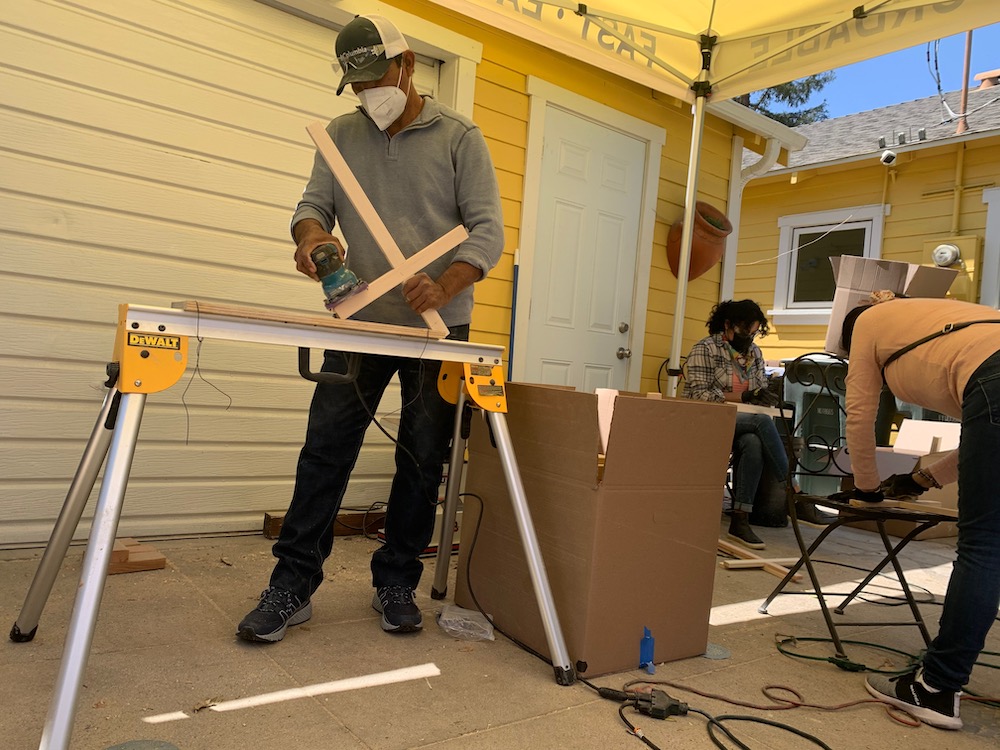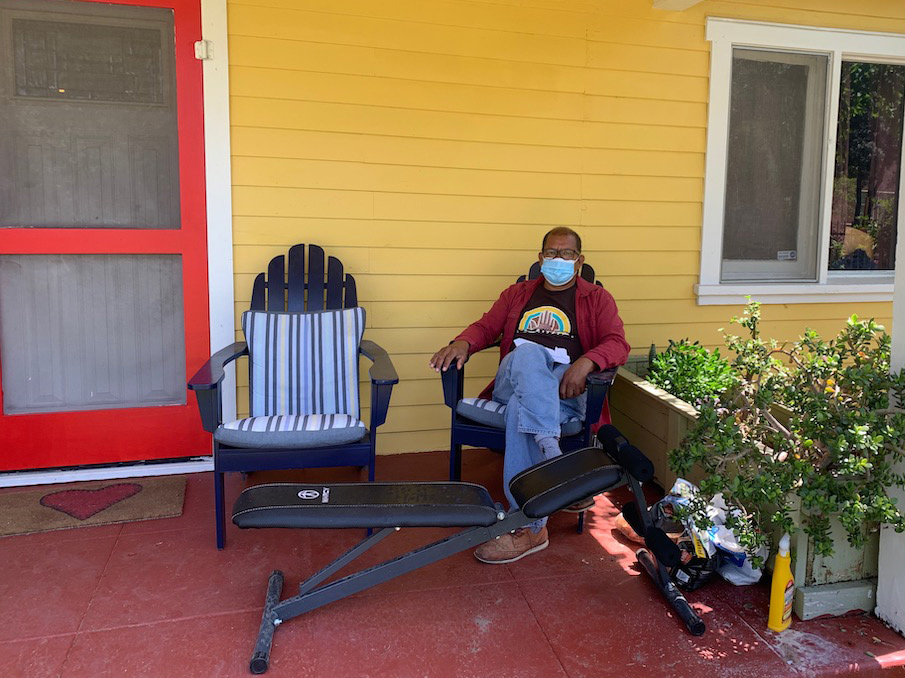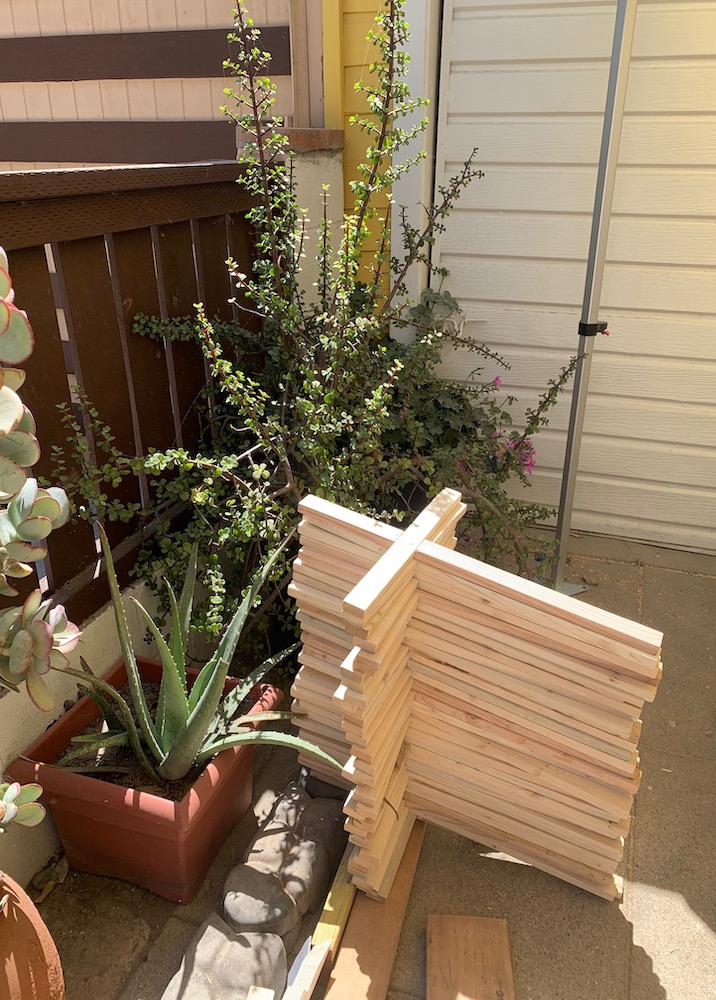The sound of power tools reverberated through the backyard of Pablo Alvarado’s Pasadena home the morning of April 16 as members of his organization, the National Day Laborer Organizing Network (NDLON) and local jornaleros, or day laborers, sculpted and sanded 600 wooden crosses. Each one represented 1,000 souls, adding up to the approximately 600,000 who have died from COVID-19 in the U.S. since March 2020.
Nearly 23,000 of those deaths have been in LA County, according to the health department, where the virus has killed Latinx residents at nearly three times the rate of white ones. Jornaleros — predominantly Latino and immigrant men who negotiate manual labor jobs day by day — have been particularly vulnerable.
“There’s a saying in Spanish,” Pablo Alvarado, co-founder and co-executive director of NDLON, said. “Solo el pueblo salva al pueblo, which means that only the people can save the people. We want to apply this to this moment. Only the people will honor the people.”
The crosses are one part of an event NDLON has planned to honor fallen jornaleros April 28, when the organization will arrange the crosses at Pasadena’s Villa Parke in the style of a veterans cemetery, each with the name, date of birth, date of death and occupation of a laborer who died this past year. Los Jornaleros del Norte, a day laborer band that includes several NDLON members, will perform a set, while several other bands will call in through Radio Jornalera, an online radio dedicated to furthering workers’ rights.
Pablo Alvarado said the event will honor the jornaleros who have continued providing services at great risk to their health, as most Americans have spent the past year isolating at home. The persecution migrant laborers have faced across multiple presidential administrations, he said, shows how the U.S. relies on and exploits immigrant workers.
“Society has decided, and particularly [the government and the employers] have decided, that there’s a segment of the population that’s okay to be sacrificed, that’s okay to be subjected to premature death,” Pablo Alvarado said. “And to me, that is the ugliest definition of racism.”
The challenges faced by jornaleros during the pandemic have multiplied. According to NDLON’s Desde Abajo Labor Enforcement (DALE) California Campaign Director Loyda Alvarado (no relation), many labor centers have closed during the pandemic and fewer employers are hiring, while those who are hiring sometimes steal wages by threatening workers with immigration enforcement. Many workers lack consistent health care or the technology needed to access vaccination appointments.
“I think we all want to go back to where we were,” Loyda Alvarado said. “And in order for us to be able to do that, we need these workers and these workers need relief.”
Loyda Alvarado said the Biden administration could take a number of steps to help jornaleros, including halting deportations, removing citizenship requirements from stimulus relief, expanding whistleblower protections to immigrant workers and legalizing those workers who have kept the country afloat during the pandemic.

Ramiro Martinez, one of a handful of jornaleros NDLON hired to assist in building the crosses, said he joined the project because he appreciates NDLON’s work and wanted to support those who have suffered.
“This way it’s visible that the brothers who died have our support and that we are with them through these crosses that are representing them,” Martinez said.
Martinez, who left Guerrero, Mexico for LA 21 years ago, said he lost work during the pandemic and that family and friends became sick, including a neighbor who died from COVID-19. Jornaleros are looking for economic relief and allies who will fight against their exploitation, he said, but what he really wants is the consistency of work. He noted that since he received the vaccine, employers already seem more comfortable hiring him.
“We don’t receive any benefits,” Martinez said. “We depend solely on what we earn working.”
Before forming NDLON, Pablo Alvarado himself worked as a day laborer after arriving from El Salvador, caught in the throes of civil war, in 1990. His father sympathized with the right-wing military government, which was heavily supported by the U.S., but Pablo Alvarado joined the leftist opposition movement. He worked with an organization that taught the rural poor how to read and write, and said he still remembers how the older men, mostly farmers, grasped gingerly at their pens and carefully sounded out their vowels. Pablo Alvarado cites schools of thought from that period in his life, such as liberation theology, as having guided his work with immigrant and labor organizing.

The impact of COVID-19 on Pablo Alvarado’s personal circle has been immense — the virus has killed the saxophonist of his band, three aunts, a fellow organizer, an uncle and cousins. In January, he contracted the virus himself, and now suffers from what the Centers for Disease Prevention and Control (CDC) calls “long COVID,” which includes brain swelling, heart palpitations and insomnia.
The April 28 event is the first Pablo Alvarado has worked on since falling ill. Honoring those who have died, he said, is about remembering how they lived, too.
“This is what the indigenous people, what our ancestors taught us,” Pablo Alvarado said. “[Death is] another dimension of existence. And we have to not just remember them, in our hearts and our souls, but also celebrate what they gave.”
![]()




































